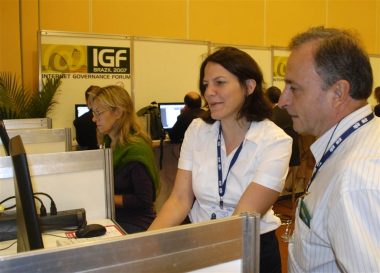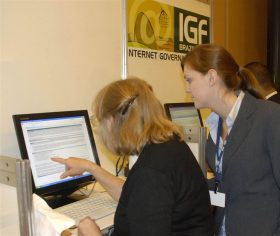A survey conducted by Elon faculty and students at the United Nations-sponsored Internet Governance Forum in Brazil identifies top issues facing development of network communications around the world. The study was conducted by the Imagining the Internet Center in the School of Communications in partnership with the Pew Internet & American Life Project.

There are now 1.4 billion people enjoying the opportunities available through the use of the Internet. But technology and policy leaders from around the world say that’s not nearly enough. They say governments and businesses must develop new strategies to provide access for the rest of the world – 5 billion people who aren’t online.
Making Internet access available globally for everyone is just one of the concerns addressed by the participants in a survey on Internet policy conducted at the second Internet Governance Forum (IGF), held in Rio de Janeiro. About 15 percent of conference attendees took part in the policy poll, which was led by Elon University’s Imagining the Internet Center and the Pew Internet & American Life Project.
The global dialogue at IGF, a series of five annual events facilitated by the United Nations, is focused on the technical resources and protocols that govern the flow of data, as well as on issues related to access, safety and security and the free flow of information. Survey participants expressed concerns over maintaining the correct balance between online security and civil liberties. They voiced strong support for an Internet Bill of Rights that might help ensure civil liberties in cyberspace. Survey results indicate this document should support the ideal that the Internet should be available to all people of the world, available in their native language and at an affordable cost.

Because only about 20 percent of the people in the world have access to the Internet there is a “digital divide” between those who enjoy digital inclusion and those who do not. Nearly 90 percent of the IGF participants responding to the Imagining the Internet survey said areas of the world without good Internet access suffer negative economic consequences, 74 percent said the quality of healthcare is improved when people can go online, and more than 70 percent said Internet access can reduce poverty by creating more and better jobs. Seventy-seven percent said only open and neutral Internet access can close the digital divide.
The cost of an Internet connection is seen as a primary barrier to online access. Two-thirds of those taking the survey said Internet service providers should be required to offer a basic, low-cost level of service to those who cannot otherwise afford it. Nearly 50 percent of the survey respondents said increased Internet connections and instruction in schools are the best choice for increasing access in remote areas; 32 percent favored placement of free Internet kiosks in public areas such as stores, libraries and cafes; community-access mobile phones were seen as a first choice by 14 percent; and the One Laptop Per Child program drew only 12 percent of the responses.
Most respondents agreed that a combination of commercial broadband development and public policies at the local and global level working in tandem will be most effective in improving Internet access, allowing the next billion people to get online, and the next billion and so on. The majority said Internet policy will always remain a step behind due to accelerating technological development. “The Internet brings unique issues to the table. It is a dynamic, transborder technology that creates a whole new global arena,” survey director Connie Ledoux Book said. “Ultimately that is the struggle the data reflects.”
The UN IGF session in Rio in November 2007 brought together nearly 1,400 Internet engineers, technology developers, government and policy experts, scientists, business leaders, journalists, consultants and others to discuss the future of the Internet and their hopes and concerns about this evolving technology. People from more than 60 countries took part in the global policy survey. Because this was a select convenience sample, although the respondents were diverse and engaged with the issues addressed by the survey, it cannot be construed as encompassing the views of all IGF participants.
Key survey findings:
- 87 percent said their countries will have little economic success without Internet access
- 81 percent said there should be global Internet protocols for business transactions
- 77 percent said they support global Internet policies to ensure that all of the languages of the world are represented fairly online
- 77 percent backed an assertion that open, equal, neutral Internet access will only continue if there are local and global policies in place to assure it
- 76 percent said there should be a global Internet policy supporting freedom of expression online; 49 percent said they doubt such global policy can be reached
- 71 percent encouraged commercial competition among Internet service providers as a way to spur Internet access and lower prices
- 66 percent support the development of a global Internet users’ Bill of Rights
- 59 percent said they oppose government control over Internet content, and 62 percent said content controls weaken the usefulness of the Internet
- 56 percent supported a global police unit to fight cybercrime
The Imagining the Internet survey was directed and written by Connie Ledoux Book, associate dean of the Elon University School of Communications, with assistance from Janna Quitney Anderson, associate professor and director of the Imagining the Internet Center. Elon students assisting in creating, implementing and analyzing the survey included Anne Nicholson, Michele Hammerbacher, Dannika Lewis and Eryn Gradwell.
Full results of the survey can be found on a special Web site dedicated to the Imagining the Internet coverage of the IGF at www.imaginingtheinternet.org.
The Imagining the Internet Center sponsors work that brings people together to share their visions for the future of communications and the future of the world. The Center’s research holds a mirror to humanity’s use of communications technologies, informs policy development, exposes potential futures and provides a historic record. It was established to illuminate emerging issues in order to serve the greater good. It explores and provides insights into emerging network innovations, global development, dynamics, diffusion and governance. The ITIC is a non-profit organization housed at Elon University’s School of Communications. It investigates the tangible and potential pros and cons of new-media channels through active research. It works to expose and help develop best practices for international development efforts in distribution and use of ICTs. The products of its research are presented in an open, online platform incorporating audio, video, archived content, research studies, quotable internet predictions and other resources, all available to the public for free.
The Pew Internet & American Life Project is an initiative of the Pew Research Center, a nonprofit “fact tank” that provides information on the issues, attitudes and trends shaping America and the world. Pew Internet explores the impact of the Internet on children, families, communities, the work place, schools, health care and civic/political life. Both the ITIC and PIAL are nonpartisan and take no position on policy issues.


